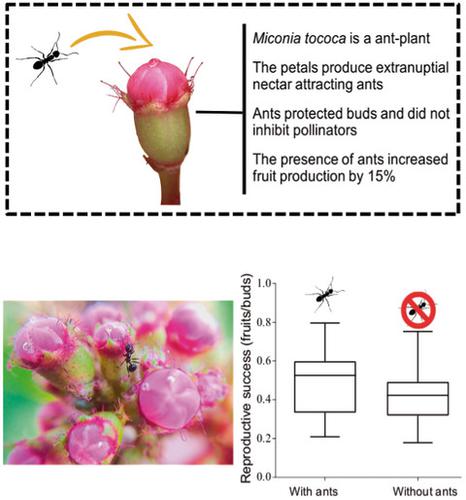当前位置:
X-MOL 学术
›
Plant Biol.
›
论文详情
Our official English website, www.x-mol.net, welcomes your
feedback! (Note: you will need to create a separate account there.)
Extranuptial nectaries in flowers: ants increase the reproductive success of the ant-plant Miconia tococa (Melastomataceae).
Plant Biology ( IF 4.2 ) Pub Date : 2020-06-02 , DOI: 10.1111/plb.13138 H C Belan 1 , G J Barônio 2 , V C Kuster 3 , D C Oliveira 1 , H L Vasconcelos 1
中文翻译:

花中的婚外蜜腺:蚂蚁可提高蚂蚁植物米科烟草(Miconia tococa)的繁殖成功率。
更新日期:2020-06-02
Plant Biology ( IF 4.2 ) Pub Date : 2020-06-02 , DOI: 10.1111/plb.13138 H C Belan 1 , G J Barônio 2 , V C Kuster 3 , D C Oliveira 1 , H L Vasconcelos 1
Affiliation

|
- Although the production of extranuptial nectar is a common strategy of indirect defence against herbivores among tropical plants, the presence of extranuptial nectaries in reproductive structures is rare, especially in ant‐plants. This is because the presence of ants in reproductive organs can generate conflicts between the partners, as ants can inhibit the activity of pollinators or even castrate their host plants. Here we evaluate the hypothesis that the ant‐plant Miconia tococa produces nectar in its petals which attracts ants and affects fruit set.
- Floral buds were analysed using anatomical and histochemical techniques. The frequency and behaviour of floral visitors were recorded in field observations. Finally, an ant exclusion experiment was conducted to evaluate the effect of ant presence on fruit production.
- The petals of M. tococa have a secretory epidermis that produces sugary compounds. Nectar production occurred during the floral bud stage and attracted 17 species of non‐obligate ants (i.e. have a facultative association with ant‐plants). Ants foraged only on floral buds, and thus did not affect the activity of pollinators in the neighbouring open flowers. The presence of ants in the inflorescences increased fruit production by 15%.
- To our knowledge, the production of extranuptial nectar in the reproductive structures of a myrmecophyte is very rare, with few records in the literature. Although studies show conflicts between the partners in the ant–plant interaction, ants that forage on M. tococa floral buds protect the plant against floral herbivores without affecting bee pollination.
中文翻译:

花中的婚外蜜腺:蚂蚁可提高蚂蚁植物米科烟草(Miconia tococa)的繁殖成功率。
- 尽管婚外花蜜的生产是热带植物间接防御食草动物的常见策略,但生殖结构中婚外花蜜的存在很少,尤其是在蚂蚁植物中。这是因为蚂蚁在生殖器官中的存在会在伴侣之间产生冲突,因为蚂蚁会抑制授粉媒介的活动,甚至会cast割其寄主植物。在这里,我们评估了这样一种假说,即蚂蚁植物米科尼可可(Miconia Tococa)在其花瓣中产生花蜜,从而吸引蚂蚁并影响坐果。
- 使用解剖和组织化学技术分析了花蕾。在实地观察中记录了花访客的频率和行为。最后,进行了蚂蚁排除实验以评估蚂蚁的存在对水果生产的影响。
- Tococa的花瓣有分泌表皮,可产生含糖化合物。花蜜的产生发生在花蕾期,吸引了17种非专性蚂蚁(即与蚂蚁植物具有兼性联系)。蚂蚁仅在花蕾上觅食,因此不影响相邻开放花中的授粉媒介活动。花序中蚂蚁的存在使果实产量增加了15%。
- 据我们所知,在分生真菌的生殖结构中产生婚外花蜜非常罕见,文献中很少有记载。尽管研究表明,在蚂蚁-植物相互作用中伴侣之间存在冲突,但在Tococa花芽上觅食的蚂蚁可以保护植物免受花草食动物的侵害,而不影响蜜蜂的授粉。











































 京公网安备 11010802027423号
京公网安备 11010802027423号